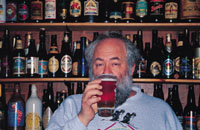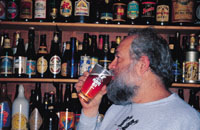It's Bottoms Up -- Way Up -- In Hokkaido
Back to Contents of Issue: September 2003
|
|
|
|
by David Wolman |
|
|
"I couldn't sell sushi or anything, Sapporo may best be known outside Japan for the famous beer of the same name, but Kaufman, a California transplant and beer connoisseur in both mind and belly, believes Japan is ready to drink up the microbrew trend that is already so popular abroad. His 13 varieties of Ezo Beer, so named for the old Japanese name for Hokkaido, include varieties such as White Crane Ale, Noboribetsu Valley of Hell Ale and Namara Nigai (Hokkaido dialect for "very bitter"). All the beers are brewed in Newport, Oregon by award winning Rogue Ales, and can be had either on tap at Mugishutei or in bottles available throughout Hokkaido and at a few bars in Tokyo.
While putting down a few pints of Rogue Honey Cream Ale at Mugishutei one night in June, Kaufman, now 50 and married with two children, recalled the various turns, fluke connections and near calamities that brought him to Sapporo and turned him into a self-described "beer maven" and the owner of a basement bar just south of Susukino, Sapporo's nightlife epicenter. After a tour around Asia in his college years, he landed in Japan when he was 23 and has been here ever since. Like most new arrivals he was teaching English, until an opportunity to run a coffee shop for a month fell in his lap.
"I made a lot of money -- more than the owner ever had in a month," says Kaufman. He decided to start a business. "But I couldn't sell sushi or anything, so I was thinking: 'What could I, as a gaijin, do here?'" The answer, he found, was selling beers from all over the world. At first it was a meager 15 labels, none of them very good. But Kaufman was hooked.
"I was coming back from trips overseas with suitcases full of beer. Then things really began to snowball." (A figure of speech, incidentally, not lost on anyone from Hokkaido.) He traveled to beer festivals and conferences, wrote about Japan's beer industry for specialty publications abroad and was constantly in search of the next porter, ale or stout to serve at Mugishutei. Meanwhile, the cans and bottles collection had begun, and today thousands of them line the shelves covering virtually every speck of wall space in the bar.
"I was working on a story for All About Beer about people illegally brewing their own beer in Japan -- the title was 'Land of the Rising Moonshiners.'" Through a friend in Tokyo who'd helped with the story, Kaufman connected with an upstart microbrewery in Olympia, Washington. He made a modest investment in Fish Brewing Co., with the understanding that Fish would begin brewing Ezo as soon as possible.
Months later Kaufman traveled to Washington to see the brewery first hand, and was greeted with both good and bad news. "I had a bad vibe," recalls Kaufman. "Finally my friend sits me down and says business is great. So great, in fact, that they won't be able to brew my beer for another two, maybe three years." Kaufman was stuck, but his friend had an idea of another brewer in neighboring Oregon.
FIFA actually took him to court They called him up immediately, and the following morning Kaufman was driving south to Newport, Or to meet Jack Joyce at Rogue Ales. He almost didn't make the rendezvous. Figuring he'd take the scenic route by the ocean, Kaufman nearly ran out of gas far from anyone or anyplace in particular. Miraculously, with the gas gauge reading empty, he rolled into an old gas station. "I nearly got killed for trying to pump my own gas, though. That's illegal in Oregon. I apologized to the owner and said I was from California. Not a great idea; I should've said I was from Japan."
Joyce liked the Ezo idea and after a night sampling too-many beers, the following morning, over Seven-Eleven coffee, Joyce, who's also a lawyer, wrote out the contract for Ezo Beer on the paper bag from Seven-Eleven. That was 1995, and since then Kaufman has designed numerous beers, some more successful than others. Buckwheat Ale and Chocolate Stout are two of his favorites.
Business isn't booming, admits Kaufman, but he's hopeful and he clearly enjoys what he's doing. Nor is he someone who takes himself too seriously. Kaufman has recently been getting his beard groomed by a well-known Tokyo pet-groomer who comes to Sapporo to teach aspiring pet stylists. "I'm going to ask for a Scottish Terrier look next." He's also the Japan representative for an angel wings business called Mother Plucker Feather Co. (www.motherpluckerfeathercompany.net), launched by an old college friend. And during the World Cup in 2002 he brewed a special beer, Warudo Geppu Biru or World Burp Beer. (FIFA, the FŽdŽration Internationale de Football Association, actually took him to court arguing the name damaged the image of the sport, but a level-headed Japanese judge disagreed.)
Kaufman's tolerance for beer and a good yarn will outlast most interviewers, but there's one final anecdote worth sharing. After being told Ezo Beer was allowed to join Sapporo's huge summer beer garden in Odori Park last year, Kaufman placed a major order with Rogue, only to be informed soon after that he was forbidden from participating. To register his displeasure, Kaufman camped out in the middle of the park and gave away 240 liters of Ezo. And as far as taste, he says, "it beat the pants off the competition." @ |
|
Note: The function "email this page" is currently not supported for this page.


 THIS GUY KNOWS HIS beer. He also knows his beards, but that's a subject for another day. Longtime Sapporo resident Phred Kaufman is founder and owner of Ezo Beer, as well as Beer Inn Mugishutei, where patrons order from a list of over 300 brews. Kaufman claims Mugishutei's selection is the largest in the Orient. (Unfortunately, due to budgetary constraints, Japan Inc was unable to pay this reporter to travel throughout Asia to confirm that claim.) Three hundred is a lot, though, especially compared to the handful of brews -- usually variations on the same theme, from the same powerhouse breweries -- served at most bars in Japan.
THIS GUY KNOWS HIS beer. He also knows his beards, but that's a subject for another day. Longtime Sapporo resident Phred Kaufman is founder and owner of Ezo Beer, as well as Beer Inn Mugishutei, where patrons order from a list of over 300 brews. Kaufman claims Mugishutei's selection is the largest in the Orient. (Unfortunately, due to budgetary constraints, Japan Inc was unable to pay this reporter to travel throughout Asia to confirm that claim.) Three hundred is a lot, though, especially compared to the handful of brews -- usually variations on the same theme, from the same powerhouse breweries -- served at most bars in Japan.
 During Japan's economic bubble, says Kaufman, the Japanese expressed a lot of interest in microbrews, but at that time it was impossible to get a brewing license in Japan without producing an enormous quantity of beer. Few operations ever got off the ground. "I had this dream of making my own beer," he says, but considering the difficulty of doing it locally, Kaufman figured it was best to brew Ezo Beer elsewhere and ship it to Japan.
During Japan's economic bubble, says Kaufman, the Japanese expressed a lot of interest in microbrews, but at that time it was impossible to get a brewing license in Japan without producing an enormous quantity of beer. Few operations ever got off the ground. "I had this dream of making my own beer," he says, but considering the difficulty of doing it locally, Kaufman figured it was best to brew Ezo Beer elsewhere and ship it to Japan.




